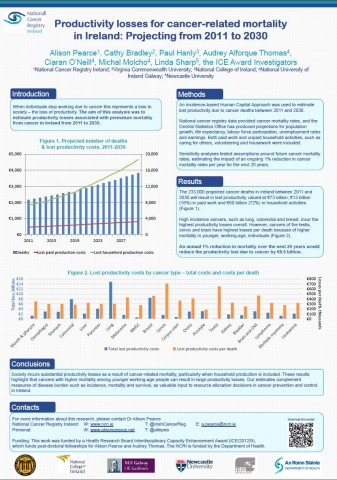Current Size: 100%
Productivity losses for cancer-related mortality in Ireland: Projecting from 2011 to 2030
Background: When individuals stop working due to cancer this represents a loss to society – the loss of productivity. The aim of this analysis was to estimate productivity losses associated with premature mortality from all cancers and from the 20 highest mortality cancers in Ireland in 2011, and project these losses until 2030.
Methods: An incidence-based method was used to estimate the cost of cancer deaths between 2011 and 2030 using the Human Capital Approach. National data were used for cancer mortality rates, population growth, life expectancy, labour force participation, unemployment and average earnings. Paid work and unpaid household activities were included. Sensitivity analyses estimated the impact of assumptions around future cancer mortality rates, retirement ages, wage growth (0% to 3.5%) and discount rates (0% to 6%).
Results: The 233,000 projected deaths from all invasive cancers in Ireland between 2011 and 2030 will result in productivity losses valued at €73 billion; €13 billion in paid work and €60 billion in household activities. The most costly cancers are lung (€14.4 billion), colorectal and breast cancer (€8.3 billion each). However, when viewed as productivity losses per cancer death, testis (€364,000 per death), cervix (€155,000 per death) and brain cancer (€136,000 per death) are most costly because they affect working age individuals. An annual 1% reduction in mortality over 20 years reduces the present value of paid productivity lost due to cancer by €11 billion.
Conclusions: Society incurs substantial productivity losses as a result of cancer-related mortality, particularly when household production is included. These results highlight that reducing incidence and mortality of high incidence cancers is important, but so too are interventions and policies to reduce the impact in low incidence cancers, that negatively impact the workforce. Our estimates provide valuable evidence to inform resource allocation decisions in cancer prevention and control.






